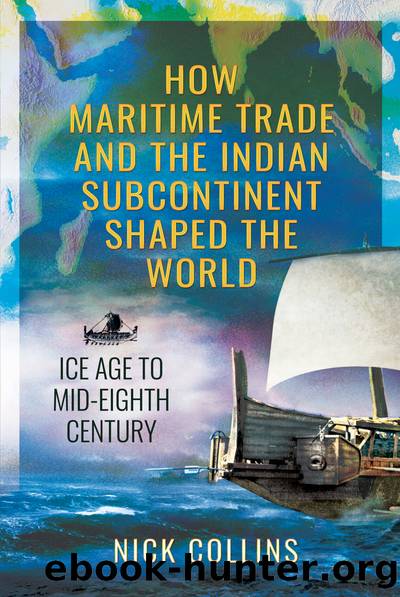How Maritime Trade and the Indian Subcontinent Shaped the World by Nick Collins;

Author:Nick Collins;
Language: eng
Format: epub
Tags: History / Maritime History & Piracy
Publisher: Casemate Publishers & Book Distributors, LLC
Published: 2022-01-30T00:00:00+00:00
Troyâs defeat unblocked access to the Black Sea. Reunified Egypt under Nekau II needed Greek and Phoenician assistance to rebuild, both with access to the Red Sea and India. Phoenicians controlled maritime choke points; the Gibraltar Straits and the Carthage Straits. Greeks were challenging Etruscans in the Tyrrhenian Sea by the establishment of Massalia. The 10th to mid-6th century BC in a revised chronology was momentous because seafaring Greeks, Phoenicians and Etruscans, battling for control of key areas, opened them up. This increased volumes and geographical extent. More secure food supply enabled population increase, innovation, the introduction of Indian philosophical ideas, mathematics, new astronomical, medical and architectural ideas, the phonetic alphabet, unprecedented wealth creation, centuries of enlightenment, the Greek golden age, the birth of western civilisation. A Phoenician golden age was derailed by Assyrian, Babylonian and Persian invasion. In conventional history, the Greek enlightenment happens without apparent cause and is often called the Greek miracle. The above explanation however, shows it happened because Phoenician traders laden with spices, ivory, ebony etc. also brought Jain and other Indian ideas. Having unblocked trade choke points, Greece fed its stomach from the Black Sea, its brain and senses with Indian ideas and spices, especially pepper, increasing wealth and leisure time, enabling it to plan and think. Subsequent 6th to 1st-century BC wars for control of Mediterranean trade routes were of the same dynamic that started with the Trojan War.
Despite early cooperation with Etruscans in Po delta ports and Phoenicians at Al Mina and Pitecusas, Greeks could not fully cooperate with each other, a legacy of diverse origins and food vulnerability. Phoenicians struck out west, without the hindrance of political and social instability at home that Greeks had. Euboeans also struck out and cooperated, but after Euboea descended into famine-induced war, others followed. When Phoenicia was conquered, Carthage took over her western colonies. The Atlantic network had been almost as vigorous as the eastern Mediterranean, far more so than the western Mediterranean but lost some vigour with the temporary reduction in bronze-production, although still used for ornaments and sculpture. As Atlantic Europe fell behind, Mediterranean maritime trade increased in volume and extent. As always happens, so did intellectual and cultural progress.
Exposure to different cultural influences encouraged a cosmopolitan trading outlook, which strove to understand trading partners. The Odyssey and Iliad were more than epics. They gave culturally and politically fragmented Greeks a common culture, a source of philosophy and practical wisdom, examples of heroic nobility and dignity, incentives to manly action and great quotations, âa counterblast to the centrifugal fragmentation of Greek parochialismâ.140 They were staging posts in the opening of minds. Homer, born in the port of Smyrna to Ionian diaspora parents, probably wrote around 750 BC.141 The Iliad is no triumphal blood and guts action drama. It challenged the heroic view of the war; its central theme, the confrontation between the hero Achilles and his commander Agamemnon. It questions obedience to his higher authority, ponders the issue of the sacrifice of life and whether it really is glorious to die in battle.
Download
This site does not store any files on its server. We only index and link to content provided by other sites. Please contact the content providers to delete copyright contents if any and email us, we'll remove relevant links or contents immediately.
| Civilization & Culture | Expeditions & Discoveries |
| Jewish | Maritime History & Piracy |
| Religious | Slavery & Emancipation |
| Women in History |
Cecilia; Or, Memoirs of an Heiress — Volume 1 by Fanny Burney(31360)
Cecilia; Or, Memoirs of an Heiress — Volume 3 by Fanny Burney(30958)
Cecilia; Or, Memoirs of an Heiress — Volume 2 by Fanny Burney(30915)
The Secret History by Donna Tartt(16693)
Sapiens: A Brief History of Humankind by Yuval Noah Harari(13100)
Leonardo da Vinci by Walter Isaacson(11936)
The Radium Girls by Kate Moore(10934)
Sapiens by Yuval Noah Harari(4567)
How Democracies Die by Steven Levitsky & Daniel Ziblatt(4436)
The Wind in My Hair by Masih Alinejad(4435)
Homo Deus: A Brief History of Tomorrow by Yuval Noah Harari(4301)
Endurance: Shackleton's Incredible Voyage by Alfred Lansing(3863)
The Silk Roads by Peter Frankopan(3804)
Man's Search for Meaning by Viktor Frankl(3662)
Millionaire: The Philanderer, Gambler, and Duelist Who Invented Modern Finance by Janet Gleeson(3584)
The Rape of Nanking by Iris Chang(3537)
Hitler in Los Angeles by Steven J. Ross(3456)
The Motorcycle Diaries by Ernesto Che Guevara(3353)
Joan of Arc by Mary Gordon(3276)
